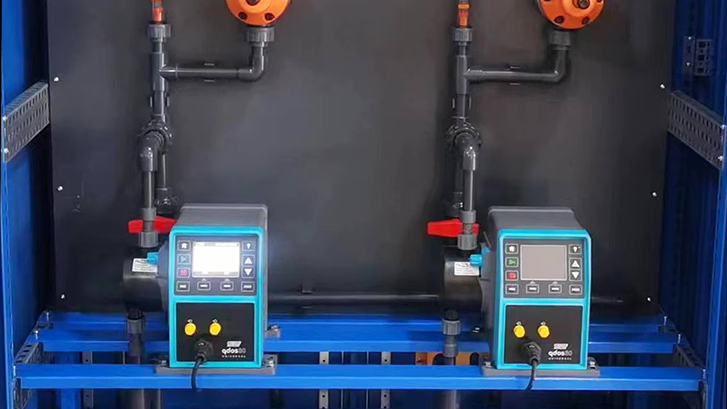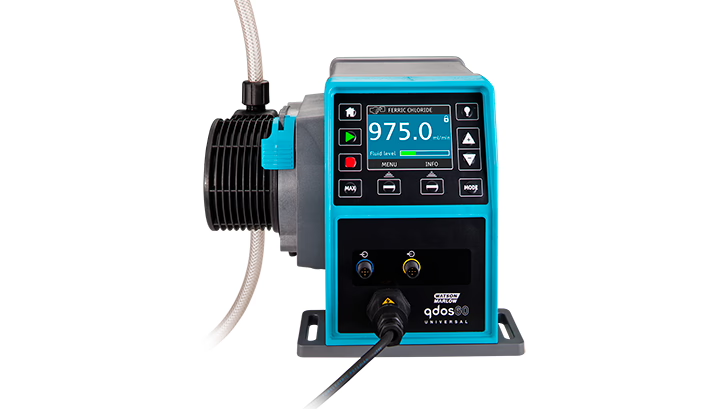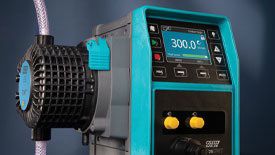- Case Study
Qdos chemical metering pumps help rural Chinese water treatment plants meet rising demand
After replacing diaphragm pumps, Qdos pumps have brought efficiencies, reliability and better safety to the water treatment plants
After replacing diaphragm pumps, Qdos pumps have brought efficiencies, reliability and better safety to the water treatment plants

Qdos® chemical metering and dosing pumps have helped transform the capability and profitability of rural water treatment plants in China to meet a rising demand for water supply.
Qdos 120 and 60 pumps were introduced to water treatment plants as part of an upgrade to improve their processes, and ensure the quality of rural water supply is the same as that of urban water supply in the area around the city of Yongkang in the Zhejiang province of China.
An increase in population in the Yongkang area is producing rising demands for water supply. Faced with this challenge, the Chinese water company contacted Watson-Marlow Fluid Technology Solutions (WMFTS) to discover how its range of Qdos pumps could assist in renovating its water supply stations.
The water company uses sodium hypochlorite (NaOCl) as a disinfectant during the water treatment process. In several water plants in the Yongkang area, a sodium hypochlorite solution with a content of more than 10% is often used, which is highly irritating to the skin and can cause burning pain, inflammation and blisters. Inhaling sodium hypochlorite can irritate the nose, throat and lungs. This makes safe containment of NaOCl, without leakages, an important factor when selecting a pump and tubing system. Leaks of polymers such as poly-aluminium chloride are also time consuming and expensive to clean up, as well as being a slip hazard.
Previously, the water company used a pneumatic diaphragm pump, which was noisy with inaccurate metering and did not guarantee the quality of the water discharged. The equipment also covered a large area, with maintenance downtime that often meant replacing the diaphragm pumps and put the safety of the equipment operators at risk due to leaks. In addition to leaks, the diaphragm pumps and associated equipment were placed in an untidy way, which caused maintenance engineers to trip due to cables or wet ground.
In November 2023, several water plants in the Zhejiang province received dosing skids from WMFTS to dose poly-aluminium chloride (PAC) as a coagulant and sodium hypochlorite as a disinfectant.
Qdos cuts costs through higher precision metering, with an accuracy of ±1 % and repeatability of ±0.5 % in dosing. Qdos peristaltic pumps can handle gaseous fluids such as sodium hypochlorite and are easy to maintain with single, no‑tools, component replacement.
Qdos dosing pumps with PROFIBUS connectivity allow engineers at the water treatment plants in the Zhejiang province to monitor dosage and line pressure remotely. Once any alarm message appears on the pump, the water company’s terminal computer will receive the information, and allow the water company to control a reliable process of disinfection.
In addition, a flushing line was added to the dosing pump skid. When the customer needs to replace the pumphead, the operators switch to tap water and flush the pipeline and pumphead. Once the pumphead is removed, leakage of toxic substances such as sodium hypochlorite can be effectively avoided, so protecting the safety of the plant engineers.
The customer's water consumption is very high during peak hours, so the water company uses two Qdos 120 with one backup Qdos 60, or one Qdos 120 with one backup Qdos 120. A single Qdos 120 is required to dose up to 65 L/hour during peak hours to dose PAC and sodium hypochlorite.
After sourcing raw water, sodium hypochlorite is introduced to eradicate pathogens. Then, PAC is added to eliminate suspended solids and further target pathogenic bacteria. Additionally, when chlorine demand is elevated and water quality deteriorates, a booster chlorination skid is strategically integrated into pipeline networks. In the event of a water production peak or an alarm on the main pump, the pump can be seamlessly switched to the standby pump to continue dosage at the Yongkang water treatment plants
.
The plant operates 24 hours a day with variations in the amount of water treated during peak and off-peak times. The PLC can remotely control the dosing, so achieving chemical and cost savings through higher accuracy metering.
The equipment engineer at one of the water treatment plants said: "This upgrade is very good for lowering maintenance downtime. The overall structure of the dosing room is compact and the space optimisation is very reasonable.”
The water plant manager also said: "I feel very satisfied with this renovation project. When you enter the dosing room, there is no noise. Compared to the previous vibration we experienced, it is now very quiet.”

"I feel very satisfied with this renovation project. When you enter the dosing room, there is no noise. Compared to the previous vibration we experienced, it is now very quiet.”
The Qdos dosing skids are ensuring the overall drinking water needs of the rural villages, as well as helping water treatment plants achieve savings in chemical costs and energy consumption.
The dosing skids featuring Qdos chemical metering pumps are helping the renovated water treatment plants in Zhejiang to provide drinking water for over 100,000 rural residents.
Case Study
Chemical Support Systems Ltd (CSS) opts for Qdos pumps from Watson-Marlow Fluid Technology...
Case Study
Case Study
Qdos peristaltic chemical metering pumps help overcome the repeated blockage of diaphragm pumps...
Case Study
Case Study
Ergon has switched to Qdos CWT for its reliability and longer life to dose chlorine
Case Study
Case Study
Safe and reliable chemical dosing helps wastewater treatment plant (WwTP) operators
Case Study
To order a product or ask a question call +63 2 295 6392 or



